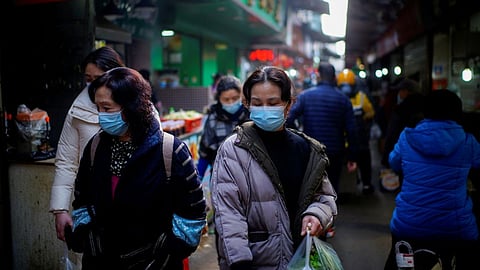

CHENNAI: There is mounting evidence that China’s zero-COVID policy is spreading disaffection among people while hurting its economy. The hope that Beijing would tweak its stringent measures against the spread of the coronavirus was dashed when President Xi Jinping doubled down on his “dynamic” anti-COVID strategy at the historic summit that secured him a third term. Meanwhile, social media was awash with stories – including that of a quarantined woman jumping to death from her apartment, as well as complaints about the shortage of food and other necessities, apart from sporadic street protests.
Almost all citizens in a district of 1.8 mn people in China’s southern metro Guangzhou were ordered to stay home last Saturday on account of undergoing virus testing as another rise in infections was reported. Ironically, it was just a few days before in the same week that China had cut down the quarantine time for inbound travellers (from 7 to 5 days) as well as scrapped restrictions on international flights as part of its measures to ease its zero-COVID policy.
Other countries like New Zealand have adopted zero-COVID policies. But these were at a time when vaccines were unavailable, death rates were high, and the virus had not yet mutated into more transmittable but less dangerous variants. At a time when only Omicron variants are prevalent, the merits of a zero-COVID policy – one that involves strict lockdowns of millions of people – is questionable.
If we accept China’s statistics, its management of COVID-19 is, on the face of it, arguably impressive. There have been far fewer deaths per 100,000 people in comparison to western nations. Even today, new daily COVID infections reported are only around 4,000 to 5,000. The big question of course is at what cost. The sudden, severe imposition of travel restrictions, which have prevented many people from returning to cities has spurred discontent among the masses.
Two things are clear. First, the cost of China’s strategy is not economic alone – it impacts the social and psychological lives of millions. Second, the economic cost cannot be calculated in terms of decline in growth – the restrictions have to be measured also in terms of loss of livelihood and lives.
Criticism of China’s COVID-19 policy in the western media has evoked nothing but disdain in Beijing. The semi-official propaganda mouthpiece, Global Times ridiculed the idea that it would end up dragging down not only the Chinese economy but also the global supply chain. Dismissing such claims as “hyperbole and fear-mongering”, it drew attention to the US’s poor handling of the pandemic and implied that attacking China was a cover to hide its own failures.
But the people are finding creative ways to express dissent — the most recent instance being the adoption of the Bappi Lahiri-composed Jimmy Jimmy song from the Bollywood film Disco Dancer. The title of the song rhymes with Jie mi, which in Mandarin translates into ‘Give me rice’. Many protestors went viral on Chinese social media apps by singing the song with empty rice vessels. Last month, just ahead of the Communist Party’s Congress, a large banner was draped over a bridge in Beijing. It read: “We don’t want COVID tests, we want food. We don’t want lockdowns, we want freedom.” If the policy persists for much longer, the sentiments in the banner could become the popular mood.
Visit news.dtnext.in to explore our interactive epaper!
Download the DT Next app for more exciting features!
Click here for iOS
Click here for Android